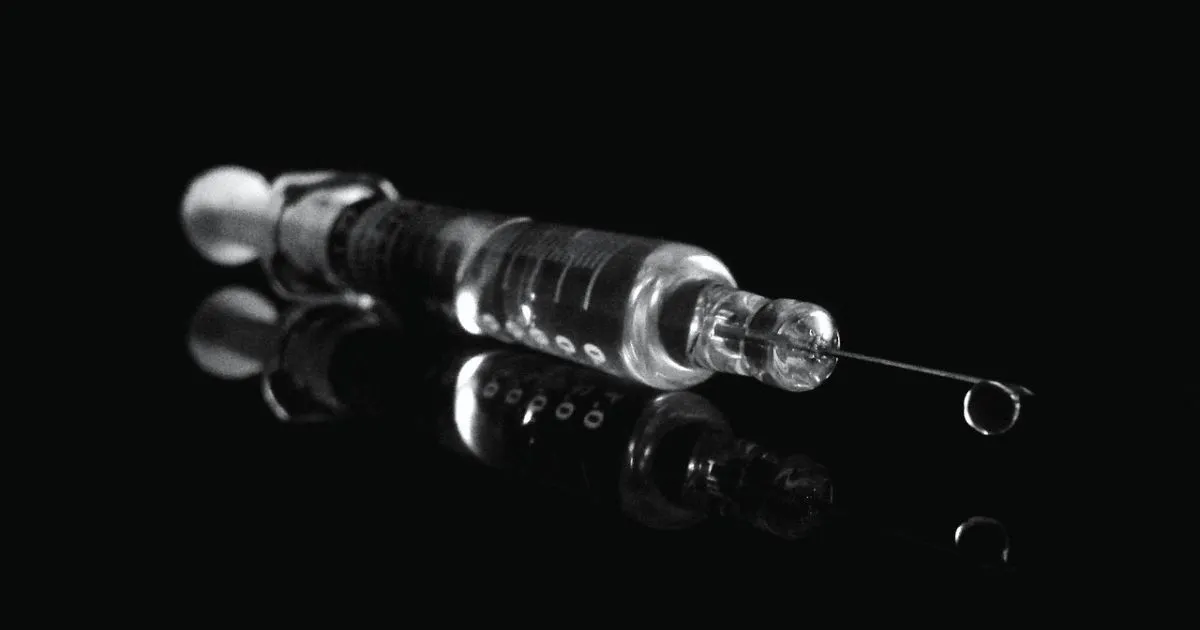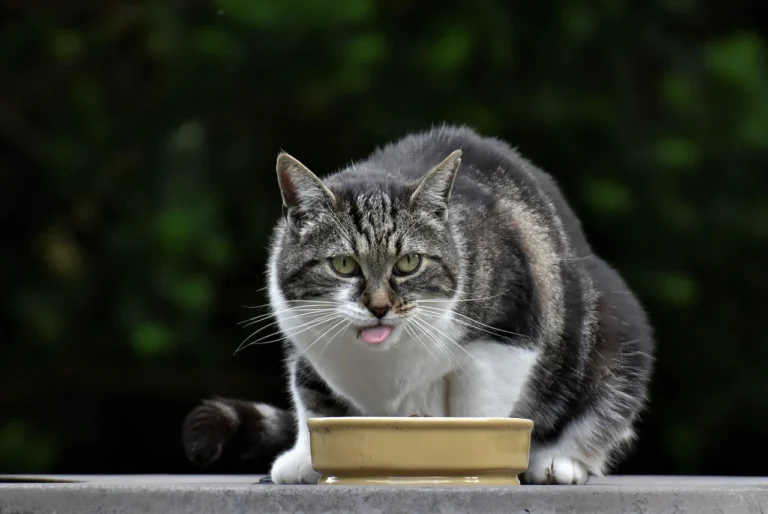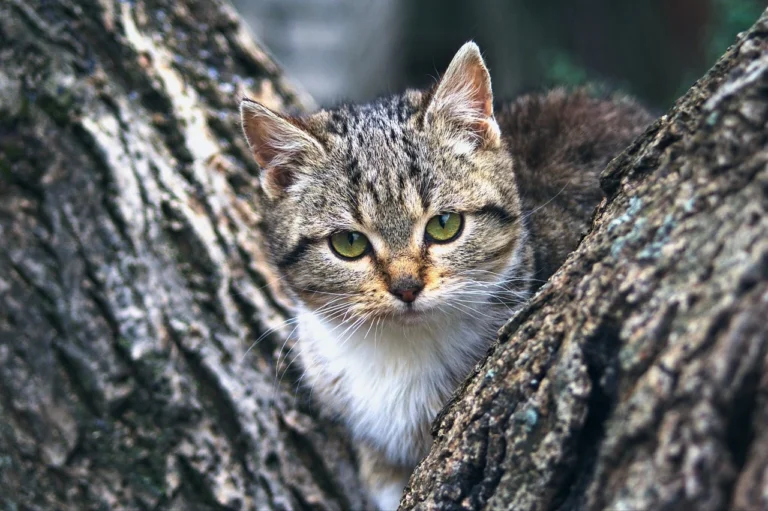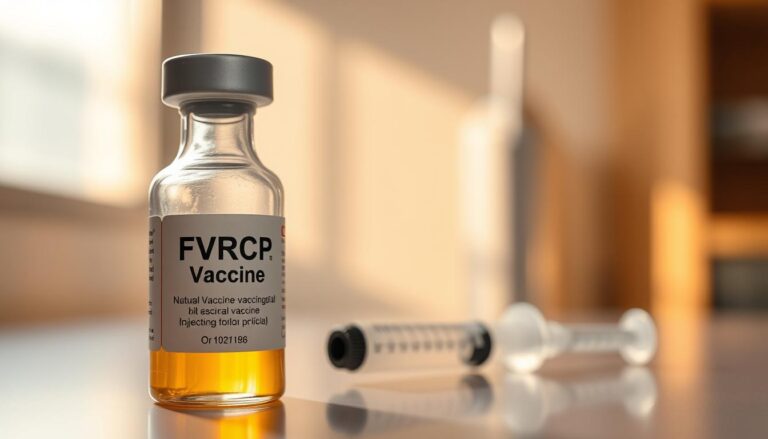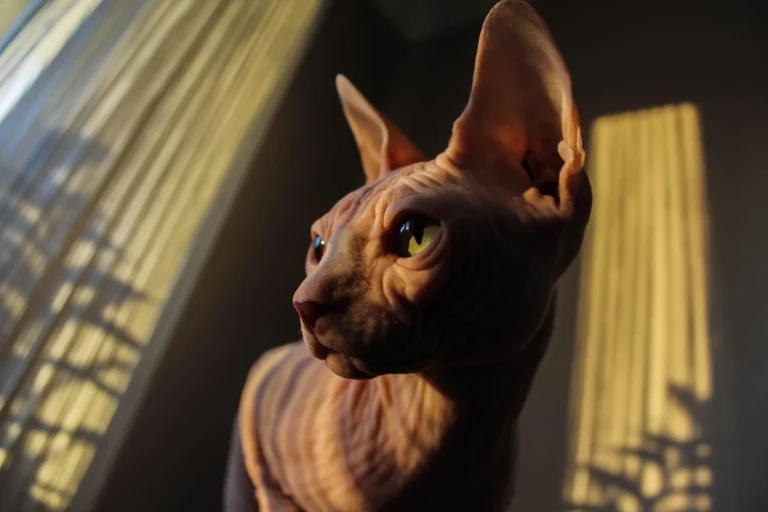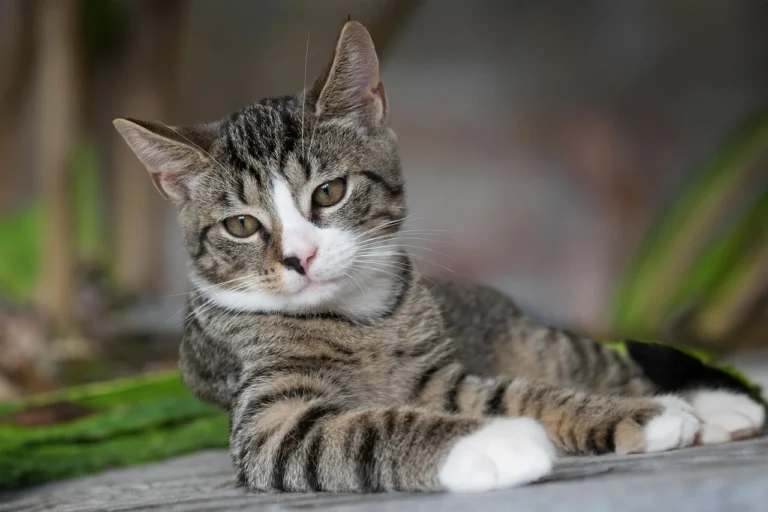FVRCP Feline Vaccine Guide: Protection, Schedule, and Safety
Table of Contents
As a devoted cat parent, protecting your furry friend’s health is key. The FVRCP feline vaccine is a vital shield against serious diseases. This guide will help you understand this essential vaccine.
Vets say the FVRCP vaccine is crucial for keeping cats healthy. It protects against three major viral infections. Knowing about this vaccine helps you make better choices for your pet’s health.
This guide is for all cat owners, new or experienced. We’ll cover the FVRCP vaccine’s importance, its protection, and vaccination schedules. We’ll also talk about safety tips for cat owners.
Understanding your cat’s health is the first step. Let’s explore core cat vaccines and how the FVRCP vaccine can save your pet’s life.
Understanding Core Cat Vaccinations and Their Importance
Cat vaccinations are key to keeping your feline friend healthy. Vets suggest a careful plan for vaccinations to protect cats from serious diseases. Knowing about different vaccines helps you choose the best care for your pet.
Pet vaccination advice usually falls into two groups: core and non-core vaccines. Core vaccines are vital for all cats, no matter their lifestyle or where they live.
Core vs Non-Core Vaccine Classifications
Vets sort cat vaccines into core and non-core types. They look at several things:
- Disease risk and prevalence
- Potential severity of the illness
- Transmission likelihood
- Geographic location
The Importance of Preventive Care
Feline immunization is more than a medical step. It’s a way to keep your cat healthy for a long time. Core vaccines guard against the most dangerous and common feline diseases. They help prevent serious health issues.
Benefits of Proper Immunization
Proper vaccination has many benefits for your cat:
- Reduces risk of serious diseases
- Strengthens overall immune system
- Prevents potential spread of infectious diseases
- Saves on potential long-term medical costs
By sticking to vet-recommended vaccination plans, you’re investing in your cat’s health. Each vaccine is a vital defense against health threats.
What is FVRCP Feline Vaccine and Its Components
The FVRCP feline viral vaccine is a key part of keeping your cat healthy. It protects against three serious diseases: Feline Viral Rhinotracheitis, Calicivirus, and Panleukopenia. This vaccine is a strong defense for your cat’s health.
Knowing what’s in the vaccine is important for cat care. Here’s what makes this vaccine so crucial:
- Feline Viral Rhinotracheitis (FVR): Caused by feline herpesvirus
- Feline Calicivirus (FCV): A highly contagious respiratory infection
- Feline Panleukopenia (FPV): Often called feline distemper
Each part of the FVRCP vaccine fights a different virus that can harm your cat. The vaccine helps your cat’s immune system make antibodies. These antibodies help fight off infections before they get worse.
| Vaccine Component | Primary Target | Disease Impact |
|---|---|---|
| Feline Viral Rhinotracheitis | Respiratory System | Causes severe upper respiratory infections |
| Calicivirus | Respiratory Tract | Leads to oral ulcers and breathing difficulties |
| Panleukopenia | Immune System | Attacks white blood cells, potentially fatal |
Vets say the FVRCP vaccine is essential for all cats. By knowing what’s in it, you can better protect your cat’s health.
Protection Against Three Major Feline Diseases
The FVRCP vaccine is a key defense for your cat’s health. It guards against three major diseases that can harm your cat’s well-being. Knowing about these illnesses shows why keeping your cat healthy is so important.
The FVRCP vaccine fights off three big threats to your cat’s health. Let’s look at the three diseases it protects against:
Feline Viral Rhinotracheitis (FVR)
Feline viral rhinotracheitis is a serious upper respiratory infection. It’s caused by herpesvirus. Cats with FVR may have:
- Persistent sneezing
- Nasal discharge
- Eye inflammation
- Potential respiratory complications
Calicivirus (FCV)
Calicivirus is another respiratory disease that can make cats very sick. It causes:
- Oral ulcers
- Fever
- Respiratory distress
- Potential joint inflammation
Panleukopenia (FPV)
Panleukopenia is the most dangerous disease for kittens. It’s a highly contagious virus that attacks the immune system. Symptoms include:
- Severe gastrointestinal damage
- Dramatic reduction in white blood cells
- High mortality rate in unvaccinated cats
- Rapid progression of symptoms
Vaccination is the best way to protect your cat from these diseases. It keeps your cat healthy and happy.
Essential Vaccination Schedule for Kittens and Adult Cats
Keeping your cat healthy begins with knowing the important vaccination schedule. Kitten shots are vital for a strong immune system early on. Their vaccine journey starts when they are 6-8 weeks old.
The first kitten shots are set up to help their immune system grow. Your vet will suggest a series of shots. These shots are key for their health.
- First vaccine: 6-8 weeks of age
- Second vaccine: 10-12 weeks of age
- Third vaccine: 14-16 weeks of age
- Final kitten booster: 16-20 weeks of age
Adult cats also need regular booster shots to keep their immunity up. How often depends on several things:
- Indoor vs. outdoor lifestyle
- Overall health status
- Risk of exposure to infectious diseases
- Veterinarian’s professional recommendation
Pro tip: Always consult with your veterinarian to create a personalized feline vaccination schedule tailored to your cat’s specific needs.
“Prevention is better than cure” – This wisdom holds true for your cat’s health and vaccination strategy.
Remember, regular and timely vaccinations are crucial for your cat’s health. A well-thought-out vaccination plan helps keep your cat healthy for life.
FVRCP Vaccine Administration and Duration of Immunity
Knowing how to give your cat the right shots is key to keeping them healthy. The FVRCP vaccine has a special way of protecting cats for a long time. This is based on expert advice for pet vaccinations.
Vets plan out the FVRCP shots carefully to keep cats safe all their lives. They use a series of shots to build strong immunity.
Initial Vaccination Series
Kittens get their first shots when they are very young. The first series starts when kittens are:
- 6-8 weeks old
- 10-12 weeks old
- 14-16 weeks old
Booster Requirements
After the first shots, your vet will suggest booster shots to keep your cat safe. The usual booster schedule is:
- A booster at one year after the first series
- More boosters every 1-3 years
Long-term Protection Guidelines
Keeping up with feline shots is important. Research shows that core vaccines like FVRCP can protect for a long time. Today’s pet vaccination advice means your cat can stay safe with fewer shots.
Ask your vet to create a vaccination plan that fits your cat’s health and lifestyle.
Safety Considerations and Potential Side Effects
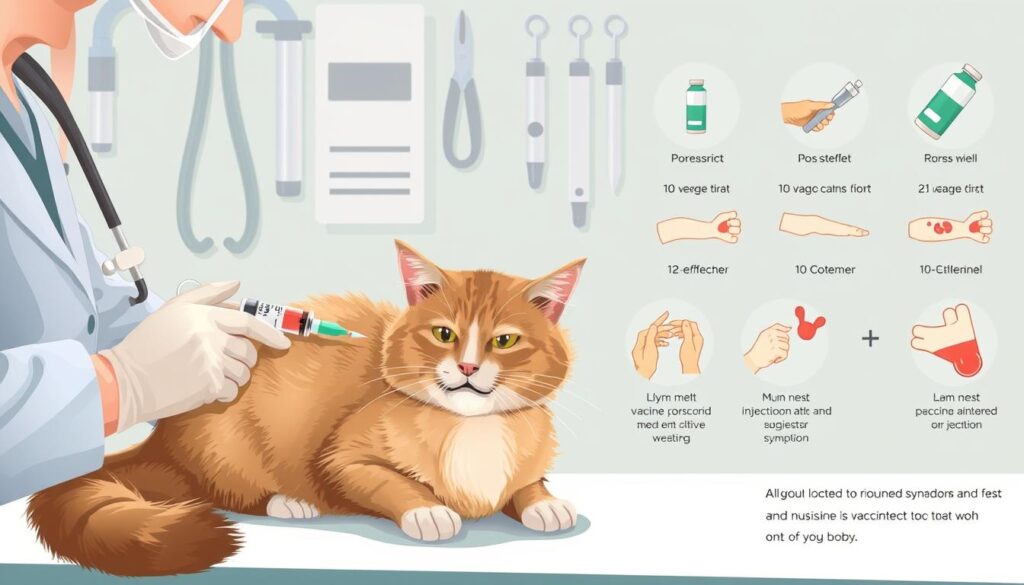
Understanding side effects of cat vaccinations is key to making good health choices for your cat. Most cats have little to no reaction to the FVRCP vaccine. Serious problems are very rare.
Common mild side effects include:
- Slight fever
- Temporary lethargy
- Small swelling at injection site
- Minimal discomfort
Vets suggest keeping a close eye on your cat after shots. Most side effects go away in 24-48 hours. If your cat’s symptoms last or get worse, call your vet right away.
Though rare, cats can get vaccine-associated sarcomas – tumors at the shot site. Modern vet care aims to lower these risks. They do this by:
- Choosing the right spot for the shot
- Using less vaccine
- Watching the shot site closely
The good news is, the benefits of cat vaccinations far outweigh the risks. Keeping your cat safe from serious diseases is the main reason for these shots.
Cost Considerations and Insurance Coverage
Understanding the costs of pet vaccinations is key to making smart choices for your cat’s health. Vaccines are a big part of keeping your cat healthy and happy.
When thinking about vaccinations for your cat, several financial factors come into play. These can affect your budget and how you care for your pet.
Average Vaccine Costs
The cost of cat vaccinations can change based on a few things. Here’s a quick look at what you might expect to pay:
- FVRCP vaccine: $20-$40 per shot
- Initial kitten vaccination series: $75-$150
- Annual booster costs: $50-$100
Payment Options and Pet Insurance
Many vets and insurance companies have flexible payment plans for vaccinations. Here are some options to consider:
- Wellness plans with bundled vaccination packages
- Pet insurance with preventive care coverage
- Veterinary financing programs
| Insurance Provider | Vaccination Coverage | Annual Cost |
|---|---|---|
| Healthy Paws | Partial Coverage | $300-$500 |
| Nationwide | Full Preventive Care | $250-$450 |
| Embrace | Wellness Rider Available | $200-$400 |
Value of Preventive Care
Investing in vaccinations can save you a lot of money in the long run. Preventing serious diseases is always more cost-effective than treating them. Keeping up with vaccinations helps avoid expensive treatments and vet visits.
Integrating FVRCP with Other Core Vaccines
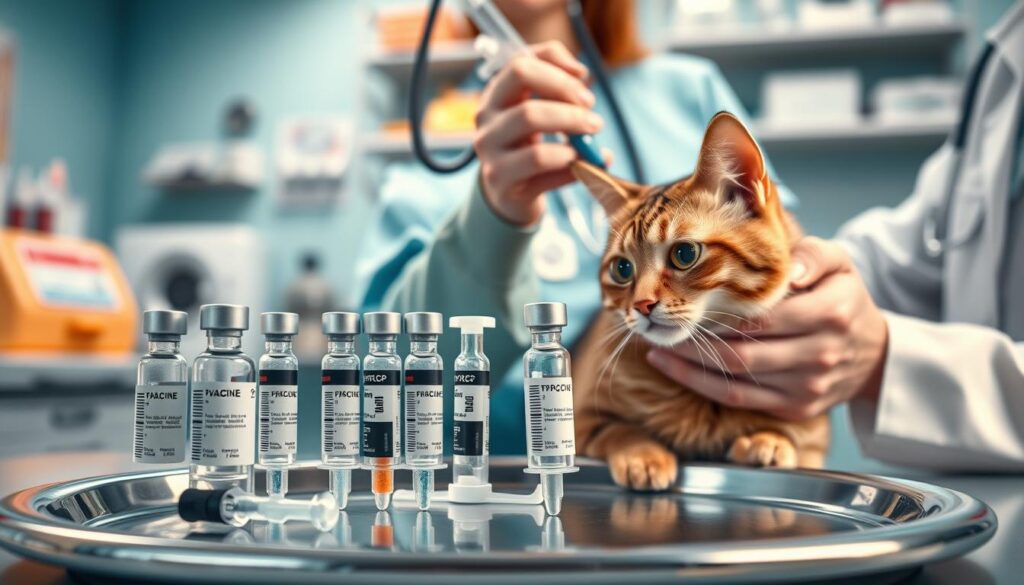
Your cat’s health plan is more than just the FVRCP vaccine. It’s important to know how all core cat vaccines work together. Vets suggest a complete plan to protect against many serious diseases.
The main vaccines are:
- FVRCP vaccine (Feline Viral Rhinotracheitis, Calicivirus, and Panleukopenia)
- Rabies vaccine
FVRCP fights off respiratory and stomach diseases. The rabies vaccine is also key. Your vet will plan a schedule based on your cat’s age, lifestyle, and health risks.
Some cats might need extra vaccines, like:
- Feline Leukemia Virus (FeLV) vaccine
- Feline Immunodeficiency Virus (FIV) vaccine
- Bordetella vaccine
Whether or not to get these vaccines depends on your cat’s life. Indoor cats might need fewer vaccines than outdoor cats or those with many other cats. Talk to your vet to find the best plan for your cat.
Veterinary experts say a custom plan is best for your cat’s health over time.
Conclusion
Keeping your cat healthy means taking care and knowing about important vaccinations. The FVRCP vaccine is key in protecting cats from serious diseases. It helps keep your pet safe from life-threatening viruses.
Your vet is the best person to help with your cat’s vaccination plan. By following the recommended schedule and knowing your cat’s health needs, you ensure their safety. Regular vet visits and timely shots lower the risk of dangerous diseases.
Seeing the FVRCP vaccine as an important investment in your cat’s future is wise. It not only protects them now but also helps them live a better life. Taking care of your cat’s health can save money and keep them active and happy.
Every cat is different, and their vaccination needs can change. Always work with your vet to find the best vaccination plan for your cat. Consider their health and lifestyle when making this plan.

